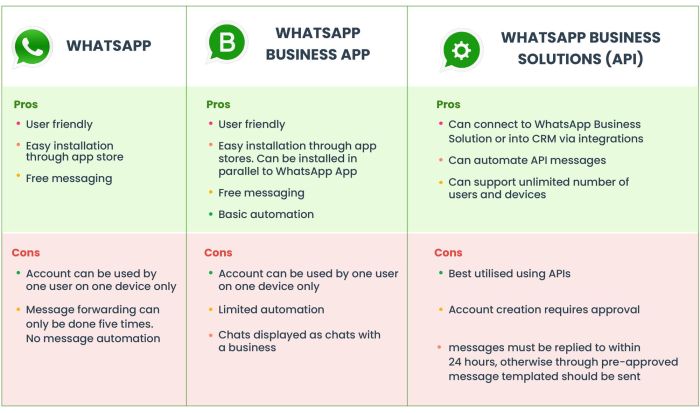WhatsApp Business CRM is revolutionizing how businesses interact with customers. This powerful combination leverages the ubiquitous messaging app to create a seamless, efficient, and personalized customer experience. From automating responses to generating insightful reports, WhatsApp Business CRM solutions are transforming sales, marketing, and customer service strategies across various industries.
The integration of WhatsApp’s vast user base with the organizational capabilities of a CRM system offers unparalleled opportunities for businesses to improve communication, enhance lead nurturing, and boost overall efficiency. This article explores the functionalities, benefits, and considerations involved in implementing a WhatsApp Business CRM, providing a comprehensive guide for businesses seeking to optimize their customer interactions.
Security and Privacy Considerations with WhatsApp Business CRM
The seemingly effortless communication facilitated by WhatsApp Business CRM presents a double-edged sword. While streamlining customer interactions, it simultaneously introduces vulnerabilities that demand careful consideration. Data breaches, unauthorized access, and non-compliance with privacy regulations are not abstract threats; they are real-world possibilities that can severely damage a business’s reputation and profitability.
Understanding these risks and implementing robust security measures is paramount for success.
Potential Security Risks Associated with WhatsApp Business CRM
The decentralized nature of WhatsApp, while offering convenience, poses significant security challenges. One major risk is unauthorized access to the CRM platform itself, whether through compromised credentials, phishing attacks targeting employees, or vulnerabilities in the CRM software itself. Another critical risk stems from the inherent limitations of end-to-end encryption.
While WhatsApp offers this encryption for individual chats, it doesn’t fully protect data stored within the CRM system. This means that data breaches affecting the CRM can expose sensitive customer information. Furthermore, the potential for human error, such as accidentally sharing confidential information or falling prey to social engineering tactics, cannot be ignored.
Finally, insufficiently secure backups can leave the business vulnerable to data loss or ransomware attacks.
Best Practices for Ensuring Data Security within a WhatsApp Business CRM
Implementing robust security protocols is crucial for mitigating these risks. This starts with enforcing strong password policies for all CRM users, coupled with multi-factor authentication (MFA) to add an extra layer of protection. Regular security audits and penetration testing can identify and address vulnerabilities before they can be exploited.
Employee training on security awareness, including phishing and social engineering tactics, is vital. Data encryption, both in transit and at rest, is essential, extending beyond WhatsApp’s end-to-end encryption to cover the CRM’s database. Regular data backups, stored securely and preferably offsite, provide a crucial safeguard against data loss.
Finally, adopting a least privilege access control model ensures that employees only have access to the data necessary for their roles, limiting the impact of a potential breach.
Compliance with Data Privacy Regulations when Using a WhatsApp Business CRM
Navigating the complex landscape of data privacy regulations is crucial. Compliance with regulations like GDPR (General Data Protection Regulation) and CCPA (California Consumer Privacy Act) requires meticulous attention to detail. This includes obtaining explicit consent for data collection and processing, providing transparent privacy policies, and ensuring data subjects have the right to access, rectify, and delete their personal data.
Regular data protection impact assessments (DPIAs) help identify and mitigate potential risks to privacy. Furthermore, maintaining accurate records of data processing activities is vital for demonstrating compliance to regulatory bodies. Failure to comply with these regulations can lead to substantial fines and reputational damage.
Addressing Customer Concerns Regarding Data Privacy
Open and transparent communication is key to building trust with customers regarding data privacy. A clearly articulated privacy policy, easily accessible on the company website and within the WhatsApp Business CRM interface, is crucial. Customers should be informed about what data is collected, how it’s used, and with whom it’s shared.
Providing mechanisms for customers to access, correct, and delete their data is equally important. Proactive communication about security incidents, should they occur, is essential to maintaining transparency and building customer confidence. Responding promptly and effectively to customer inquiries about data privacy is also vital in fostering trust and demonstrating a commitment to data protection.
Epilogue
Ultimately, the adoption of a WhatsApp Business CRM represents a strategic move towards enhancing customer relationships and driving business growth. By carefully selecting the right platform, implementing best practices, and prioritizing data security, businesses can unlock the full potential of this powerful tool.
The benefits – from improved customer satisfaction and increased sales efficiency to streamlined operations and better lead generation – are undeniable. The future of customer engagement is undeniably intertwined with the strategic deployment of WhatsApp Business CRM solutions.

